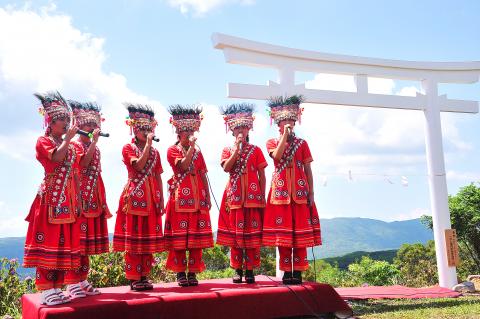A Chinese man who claims to have spent time in jail for setting fire to Japanese property in Japan and South Korea has threatened to burn down a Japanese shrine in Pingtung County.
The man, who identified himself as Liu Qiang (劉強), said in a video on Twitter that he plans to “rid Taiwan of the obstruction caused by separatists and allow the ‘mother country’ to be united.”
Liu described plans to visit Pingtung County “some time in September” to destroy the Gaoshi Shrine (高士神社), which was built “on Chinese land by Japanese invaders.”

Photo: Tsai Tsung-hsien, Taipei Times
“My goal in destroying the shrine is to declare that Taiwan belongs to China,” he said, adding that he was not afraid of prison or “being extradited to Japan by the Taiwanese separatists.”
Police on the Hengchun Peninsula (恆春半島), where the shrine is located, said that they are on heightened alert and have increased patrols at the temple.
One resident said the locals hoped that the shrine, which is a historical site and scenic attraction, would not be politicized in the run-up to national elections in January.
“The shrine was not built for political reasons. The constant politicizing of the shrine is gravely misleading and erroneous,” they said.
Japanese Shinto priest Kenichi Sato, who rebuilt the shrine in 2015 and donated it to the county to thank Taiwanese for their support and assistance during the earthquake and tsunami that struck northern Japan in 2011, said that the shrine was originally built for religious reasons.
Built during the Japanese colonial period in 1939, the shrine had been damaged by typhoons over the years and left in a state of disrepair, he said.
Sato became involved in the shrine’s repair after young Paiwan locals asked Shinto officials in Japan to assist with its restoration.
Shrine manager Chen Chung-yuan (陳重源) said that the shrine still has religious meaning for some people and is a part of the county’s cultural history, as well as a scenic spot.
If the shrine were to be burned down it would bring immeasurable harm to the local Paiwan community and damage the community’s relationship with non-Paiwan people, he said.
Chen said that he contacted the police and immigration authorities when he learned of the threat.
Liu’s post was shared by more than 60,000 Japanese users on Twitter, with many urging Taiwanese to remain alert.
Last year, a 68-year-old Taiwanese man surnamed Chung (鍾) also threatened to burn the shrine to commemorate the 1937 Marco Polo Bridge Incident.
Former Chinese Nationalist Party (KMT) lawmaker Alex Tsai (蔡正元) had previously posted an article criticizing the Democratic Progressive Party for allowing it to be restored and called the shrine an insult to Aborigines.

Chinese Nationalist Party (KMT) Chairman Eric Chu (朱立倫), spokeswoman Yang Chih-yu (楊智伃) and Legislator Hsieh Lung-chieh (謝龍介) would be summoned by police for questioning for leading an illegal assembly on Thursday evening last week, Minister of the Interior Liu Shyh-fang (劉世芳) said today. The three KMT officials led an assembly outside the Taipei City Prosecutors’ Office, a restricted area where public assembly is not allowed, protesting the questioning of several KMT staff and searches of KMT headquarters and offices in a recall petition forgery case. Chu, Yang and Hsieh are all suspected of contravening the Assembly and Parade Act (集會遊行法) by holding

PRAISE: Japanese visitor Takashi Kubota said the Taiwanese temple architecture images showcased in the AI Art Gallery were the most impressive displays he saw Taiwan does not have an official pavilion at the World Expo in Osaka, Japan, because of its diplomatic predicament, but the government-backed Tech World pavilion is drawing interest with its unique recreations of works by Taiwanese artists. The pavilion features an artificial intelligence (AI)-based art gallery showcasing works of famous Taiwanese artists from the Japanese colonial period using innovative technologies. Among its main simulated displays are Eastern gouache paintings by Chen Chin (陳進), Lin Yu-shan (林玉山) and Kuo Hsueh-hu (郭雪湖), who were the three young Taiwanese painters selected for the East Asian Painting exhibition in 1927. Gouache is a water-based

Taiwan would welcome the return of Honduras as a diplomatic ally if its next president decides to make such a move, Minister of Foreign Affairs Lin Chia-lung (林佳龍) said yesterday. “Of course, we would welcome Honduras if they want to restore diplomatic ties with Taiwan after their elections,” Lin said at a meeting of the legislature’s Foreign Affairs and National Defense Committee, when asked to comment on statements made by two of the three Honduran presidential candidates during the presidential campaign in the Central American country. Taiwan is paying close attention to the region as a whole in the wake of a

OFF-TARGET: More than 30,000 participants were expected to take part in the Games next month, but only 6,550 foreign and 19,400 Taiwanese athletes have registered Taipei city councilors yesterday blasted the organizers of next month’s World Masters Games over sudden timetable and venue changes, which they said have caused thousands of participants to back out of the international sporting event, among other organizational issues. They also cited visa delays and political interference by China as reasons many foreign athletes are requesting refunds for the event, to be held from May 17 to 30. Jointly organized by the Taipei and New Taipei City governments, the games have been rocked by numerous controversies since preparations began in 2020. Taipei City Councilor Lin Yen-feng (林延鳳) said yesterday that new measures by